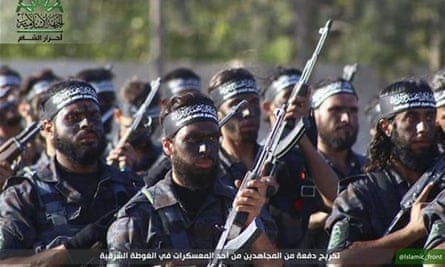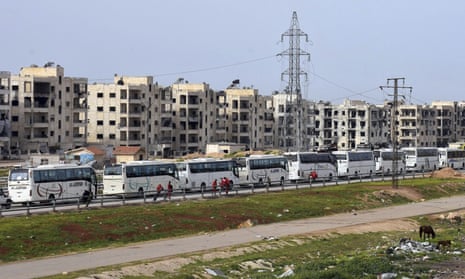A group of 26 Qatari royals held hostage in Iraq by an Iranian-backed militia have been released after nearly 18 months in captivity as part of an extraordinary regional pact centred on four besieged Syrian towns.
The royals, many of them cousins of Qatar’s emir, were handed over to the Iraqi interior minister on Friday by the powerful Keta’eb Hezbollah group, which seized the royals during a December 2015 hunting trip in the deserts of southern Iraq.
The fate of the Qataris had increasingly been tied up with that of two Shia villages west of Aleppo and two Sunni towns near the Lebanese border, whose populations had been part of delicate negotiations for the past year. On Friday evacuations from the four communities were continuing.
Ahrar al-Sham, a Syrian militia group, said 500 prisoners were released from Syrian regime jails on Friday, as another component of the deal.
The so-called four towns deal has been brokered by Iran and Qatar and involved many of the region’s most powerful non-state players, including Lebanese Hezbollah and the latest incarnation of the al-Qaida-inspired Syrian group Jabhat al-Nusra.
Lebanese Hezbollah and Keta’eb Hezbollah are Iranian proxies; the former has been heavily involved in the Syrian civil war and the latter has played a prominent role in Iraqi affairs, fighting against US forces and having involvement in the war with Isis. Qatar has been a key backer of Ahrar al-Sham, a powerful Islamist opposition group in northern Syria. It has also been accused of links to al-Nusra.
As revealed exclusively by the Guardian last week, the deal has involved large ransom demands and payments, secret summits in the Qatari capital, Doha, and comes amid claims that Syria’s demography is being re-engineered to suit the interests of Iran and its proxies.

It also led to the slaughter of more than 125 Shia civilians last Saturday when a suicide bomber drove a car into buses carrying people migrating across Syria.
The royals were received in Baghdad before being returned to Doha, where the latest phase of the deal had been finalised. Although the men had been missing for almost a year, their return was not tied to negotiations in Syria until last November, after which talks that had previously stalled in Istanbul between Ahrar al-Sham and Iran gained new impetus.
None of the stakeholders would discuss ransom payments, or publicly admit that money had changed hands for the deal to go ahead. However, Keta’eb Hezbollah is known to have put a price on the return of its captives, and both Syrian militias had agreed to facilitate the exodus from Fuaa and Kefraya after discussions with Qatari brokers.
Officials in Baghdad said a Qatari plane that arrived in Baghdad on Saturday was carrying large bags that Qatari government officials refused to allow to be searched. Iraqi officials said they believed that the bags had contained cash that was used to finalise the release.
Meanwhile, Shia refugees in Syria said some among them had been taken to east Aleppo, which was recaptured from the anti-Assad opposition last December. Others had been taken to a regime neighbourhood of Homs, and more to the western suburbs of Damascus.
Hundreds more people left the Sunni village of Madaya near the Lebanese border on Friday, for Idlib province. Thousands more had chosen to remain after receiving assurances from Hezbollah that they would not be forced to leave.
The area between west Damascus and the Lebanese border is strategically sensitive for the Lebanese militia and the Syrian regime, which it has backed throughout much of the war. Earlier in negotiations, according to Ahrar al-Sham, Iran had proposed a direct swap of Shia villagers for Sunni residents, with Shias repopulating the towns of Zabadani, Madaya and Qusair, bordering Lebanon.
